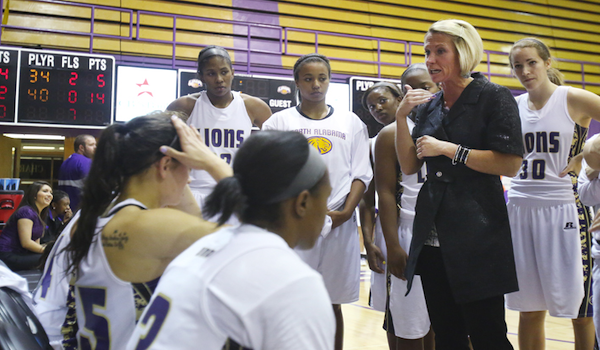After 12 seasons as a Head Coach at the Division I and II levels, Missy Tiber used this experience in 2013 to embark on the challenge of leading the University of North Alabama’s transition from the NCAA Division II to Division I level. Tiber’s hard work is paying off, resulting in a successful first season competing against Division I competition for UNA.
Having been a Head Coach at multiple universities at multiple levels, what have you learned to be the top three priorities for any coach taking over a new program?
Invest in the kids already in the program. They are your players whether you recruited them or not, so take the time to build quality relationships and get them to buy into you as the Head Coach. If you can do that early in the process, you’ll have a better chance of being successful and building the culture you desire.
Implementing your style on and off the court early is crucial. Your coaching philosophies must be taught to everyone in the program from players to assistant coaches to strength coaches. Everyone must be on board with what you are trying to do. You must have a system and know how you want to put it into place, and it must start from day one.
Hiring your staff may be the most important thing you’ll do when taking over a program. It is so important to surround yourself with loyal assistants who you can trust and who work unbelievably hard. I also find it important to hire individuals you like and want to spend time with. Our profession is so time consuming and it makes it a lot easier when you can laugh and have a good time with your staff. Don’t always hire people you know, it isn’t always the best route. Two of my best hires were people I never knew. I researched them thoroughly and what I found out was they were great people who turned into being excellent assistant coaches for me.
Once you knew UNA would be transitioning to Division I, what strategies did you immediately start implementing to enable a smooth & successful transition?
Recruiting. At the time of the announcement, I had two players in the program who I thought were capable of being DI players. They were only Freshmen and hadn’t played a game, but the potential was there. We knew recruiting was going to be huge, and we had to get it right early. We immediately pursued a couple of DI transfers. Both of these young ladies found it attractive that they could play immediately and then finish their careers for two seasons back as DI athletes. That has paid off tremendously for our program. Along with a Junior College signee, these five are now Juniors and have started together for the last two seasons. This is the major reason why we are experiencing much success in our first DI season.
Staff. Having continuity on our staff during the transition was also important. Our administration supported allowing me to promote our Graduate Assistant to a full time coach. This was vital for us because she is an excellent coach and had played an important role in us turning the program around before the transition.
Scheduling. We wanted to put together a schedule that was challenging but would also give our team an opportunity to be competitive. As a Head Coach, I believe you can teach your kids how to win or how to lose based upon your scheduling philosophy. My Associate Head Coach did an excellent job with the schedule for our first DI season.
What have you learned to be important qualities / non-negotiable when interviewing assistant coaches to become a part of your staff?
Trustworthiness, a tireless work ethic and just being a good quality individual are crucial for me. I usually have a pretty good feel for candidates during the interview process, but it’s very important to ask them specific questions on how they would handle a situation. You must get a true understanding on what a person would do, and if this person would be someone you could trust as you build a program. I always ask the question “if a player came to you complaining about me as the Head Coach, how would you handle that?”It’s always interesting to hear these responses.
Also, when hiring an Assistant Coach, I always find it important to talk to people who are not on their list of references.
What advice do you have for non-Division I head coaches who desire to become a DI Head Coach?
Invest everything you have into your current position. If you work hard, study the game, experience success and do things the right way, your next job will find you. Don’t get caught up into trying to emulate the paths that others have taken to become DI head coaches.

